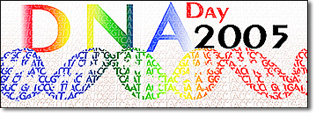Last updated: March 23, 2012
Students to Chat Online With Leading Genome Researchers For National DNA Day

Students to Chat Online With Leading Genome Researchers For National DNA Day
Virtual Celebration Encourages Exploration of Genomic Careers
 BETHESDA, Md., Tues., April 5, 2005 - On April 25, high school students across the country will celebrate National DNA Day by tuning in to webcasts featuring cutting-edge genomic research and taking part in a live online discussion with researchers from the National Human Genome Research Institute (NHGRI), part of the National Institutes of Health (NIH).
BETHESDA, Md., Tues., April 5, 2005 - On April 25, high school students across the country will celebrate National DNA Day by tuning in to webcasts featuring cutting-edge genomic research and taking part in a live online discussion with researchers from the National Human Genome Research Institute (NHGRI), part of the National Institutes of Health (NIH).
National DNA Day, begun in April 2003, commemorates the successful completion of the Human Genome Project and the anniversary of the discovery of DNA's double helix in1953. The event is a collaboration of NHGRI, American Society of Human Genetics, Genetics Society of America, the Genetic Alliance and the National Society of Genetic Counselors.
"As we embark on the genome era, we face an urgent need for a new generation of young professionals trained in everything from molecular biology to computer science to bioethics. National DNA Day is a wonderful opportunity for students to learn from real-life genome researchers how they can join in the effort to use genomics to improve human health," said NHGRI Director Francis S. Collins, M.D., Ph.D.
The first DNA Day webcast will feature Dr. Collins, co-leader of the Human Genome Project, who will discuss "The Genome Era: What It Means for You." The second webcast will feature Elaine A. Ostrander, Ph.D., chief of NHGRI's Cancer Genetics Branch, who will describe her work using the dog genome to understand human disease in a talk entitled "The Power of Comparison: Unleashing the Dog Genome." Both webcasts will be available on April 25 at www.genome.gov/DNAday.
In addition to viewing the free, on-demand webcasts, teachers and students can take part in a live online chat with NHGRI researchers from 8 a.m. to 4 p.m. Eastern time at www.genome.gov/DNAday. Experts will be on hand to field questions about a wide-range of topics, including basic science, clinical research, genomic careers and the ethical, legal and social implications of genomic research. For those unable to participate in the live event, a transcript of the chat will be available on the DNA Day Web site.
"As we expand our public education program we are pleased that computer technology is enabling NHGRI to reach out to teachers and students across the country in small towns and urban school districts and connect them with genome researchers on National DNA Day," said Vence Bonham, J.D., chief of NHGRI's Education and Community Involvement Branch. "We hope that National DNA Day will excite more students from all walks of life to learn about genome science and careers in genomics."
To help teachers and students make the most of National DNA Day, NHGRI is offering a variety of free, educational tools on genetics and genomics, which are available at www.genome.gov/DNAday.
In addition to the online resources, dozens of researchers and staff from NHGRI will serve as "DNA Day Ambassadors" visiting high schools in rural and urban communities across the country. These ambassadors will help explain basic science concepts and share first-hand some of their experiences on the front lines of genomic research. A state-by-state list of NHGRI's DNA Day Ambassadors and their schools is available at www.genome.gov/13514592/2005-release-national-dna-day-ambassadors/.
NHGRI is one of the 27 institutes and centers at the NIH, an agency of the Department of Health and Human Services (DHHS). Additional information about NHGRI can be found at its Web site, www.genome.gov.
For more information, contact:
Geoff Spencer, NHGRI
(301) 402-0911
